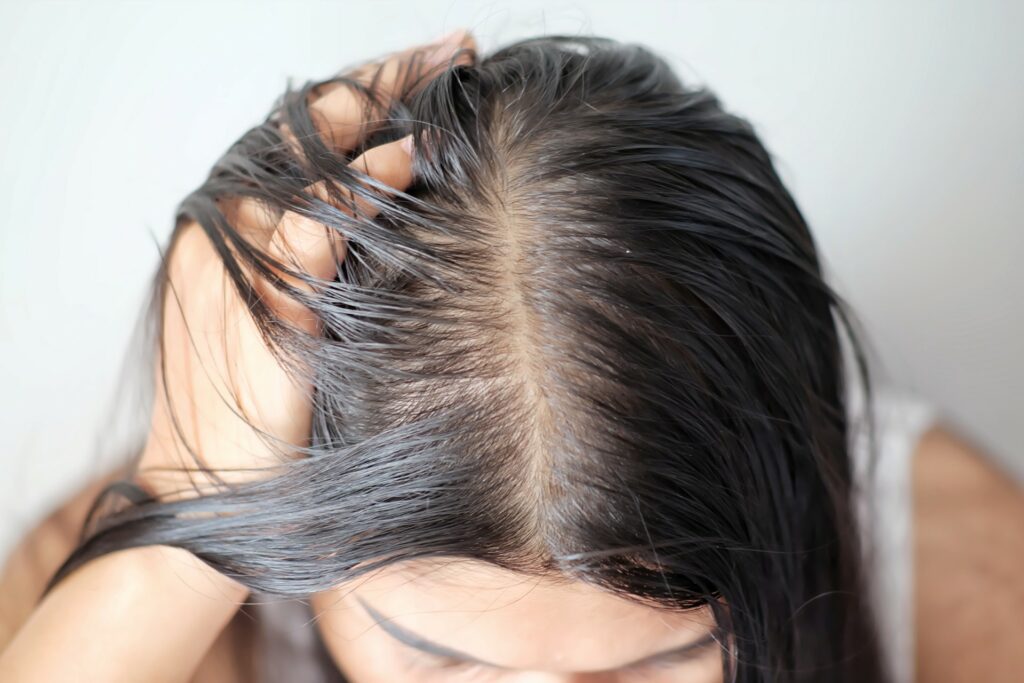Dermatologists Shed Light on Oily Skin and Hair

Everyone knows that dermatology focuses on the skin’s health. Whether age spots, eczema, or skin cancer screenings, full-service dermatology offices help clients with various skin conditions and concerns. However, what is less well-known is that dermatologists specialize in hair and nail health. People who suffer from dry skin often seek the professional help of a licensed dermatologist, but the cause may not be dry skin but oily skin. Let’s explain.
Expected Oily Skin
It is common for those going through puberty to experience oily skin. Oil, in itself, is not bad. Oil is necessary for healthy skin and hair. However, when hair and skin seem oily all the time, it can seem out of control and make people self-conscious about their appearance. If you feel limited by your skin or hair being excessively oily, seek help from a professional dermatologist. Sometimes, oily skin that never seems to go away may indicate other skin conditions that can be addressed and treated.
Other Oily Skin Related Conditions
Dermatitis is a common word used in dermatology. Seborrheic dermatitis can inflame the skin and cause irritation. The scaly result on the skin can be itchy, flaky, and become hardened. Over-oily glands hardly seem like they would result in dry patches, but they do and show up as dandruff and flaking dry skin patches. If someone has an allergic reaction or an autoimmune condition, these may be the results. Dermatologists can diagnose, prescribe, and guide clients suffering from seborrheic dermatitis with an office visit, and treatment can most often be done at home.
There are a few skin conditions that trigger over-active oil glands. Forehead acne is a common skin condition that is highly treatable. Acne occurs when oil, dirt, and skin cells are trapped in the pores, and the built-up bacteria turn into bumps and pustules. Genetics is another common reason people experience oily skin and scalp issues. The glands may produce more oils and could be something your family has dealt with for decades.
Oily Skin, Scalp, and Hair Health
Hair health is closely related to skin health, which is why dermatology covers both. Someone may be experiencing oily scalp and dry hair or oily hair and dry scalp with dandruff. Allergies, eczema, and psoriasis are all common causes of flare-ups and can occur simultaneously. If you are concerned about excessively oily skin, visit a reputable and experienced dermatologist. Call Buckhead Dermatology for an appointment if you live in the greater Atlanta area. The attentive and caring staff supports dermatologist Sherrie Straughn, who has more than two decades of experience in the field.
Over-the-Counter Remedies for Oily Skin and Scalp
There are a significant number of over-the-counter products that may help with extremely oily skin. Again, what may seem counter-intuitive, is to take a fish oil supplement. Fish oil can provide the body with the needed oil and prevent overactive glands. Another product is aloe vera, but be sure to avoid high alcohol content, which is drying and may cause the skin to overcompensate in getting moisture to the skin. Probiotics are another supplement that may be suggested, but any supplement should be mentioned to your doctor or dermatologist to ensure safe use. A popular social media trend home remedy is applying apple cider vinegar to washed hair and rinsing. There are shampoos specifically designed for oily hair, but these may contain benzoyl peroxide and sulfides. Everyone can find an affordable and manageable solution to oily skin.
Things To Do Immediately to Treat Oily Skin
Hair washing must be purposeful and may need to be done more or less often to balance the hair and scalp. Conditioner should never be applied close to the roots – conditioner and hair masks are for the ends only! Regularly clean your hairbrush, and a simple dish detergent diluted can be used. Stay away from products with silicone and be gentle with your hair! After getting sweaty, wash your hair, and do not let the dirt attach to the sweat and stay on your scalp. Try a dry shampoo if you need to reduce your washing – there are outstanding dry shampoo products that have tints and are eco-friendly!
Pesky Oily Hair and Scalp Can Be Treated Professionally
Many people choose to treat oily hair and scalp on their own and have success. However, some have tried multiple treatments to no avail, and this is when it is time to call a dermatologist and get help. Worsening symptoms should be seen immediately, and because of their licensing, a professional dermatology office can prescribe a medicated shampoo or a topical solution that can remove the problem. If an oily scalp and hair are preventing you from living a happy life, call the friendly team at Buckhead Dermatology to answer your questions and schedule an appointment.
